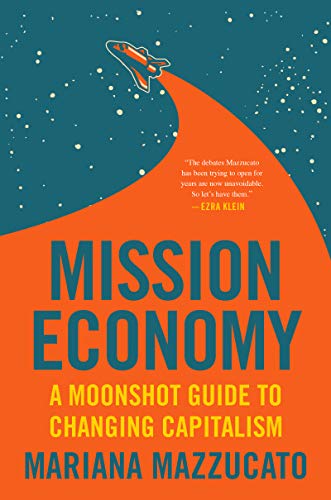Ditmir Bushati
Father & husband. Member of the Albanian Parliament. Proudly served as Minister of Foreign Affairs 2013-2017; Minister for Europe and Foreign Affairs 2017-2019
Book Recommendations:
Recommended by Ditmir Bushati
“Fascinating book by @MazzucatoM on rethinking the capacities and role of government within our economy and society, recovering a sense of public purpose. As part of progressive politics we need to talk more about wealth creation instead of just redistribution of wealth. https://t.co/xUpEddBS1a” (from X)
by Mariana Mazzucato·You?
by Mariana Mazzucato·You?
Longlisted for the 2021 Porchlight Business Book Awards, Big Ideas & New Perspectives “She offers something both broad and scarce: a compelling new story about how to create a desirable future.”—New York Times An award-winning author and leading international economist delivers a hard-hitting and much needed critique of modern capitalism in which she argues that, to solve the massive crises facing us, we must be innovative—we must use collaborative, mission-oriented thinking while also bringing a stakeholder view of public private partnerships which means not only taking risks together but also sharing the rewards. Capitalism is in crisis. The rich have gotten richer—the 1 percent, those with more than $1 million, own 44 percent of the world's wealth—while climate change is transforming—and in some cases wiping out—life on the planet. We are plagued by crises threatening our lives, and this situation is unsustainable. But how do we fix these problems decades in the making? Mission Economy looks at the grand challenges facing us in a radically new way. Global warming, pollution, dementia, obesity, gun violence, mobility—these environmental, health, and social dilemmas are huge, complex, and have no simple solutions. Mariana Mazzucato argues we need to think bigger and mobilize our resources in a way that is as bold as inspirational as the moon landing—this time to the most ‘wicked’ social problems of our time.. We can only begin to find answers if we fundamentally restructure capitalism to make it inclusive, sustainable, and driven by innovation that tackles concrete problems from the digital divide, to health pandemics, to our polluted cities. That means changing government tools and culture, creating new markers of corporate governance, and ensuring that corporations, society, and the government coalesce to share a common goal. We did it to go to the moon. We can do it again to fix our problems and improve the lives of every one of us. We simply can no longer afford not to.
Recommended by Ditmir Bushati
“A fascinating book by #SirNoelMalcolm about the history of #Albanians: “Rebels, Believers, Survivors”! #WeekendRead https://t.co/qbv07JlxPW” (from X)
Thanks to its half-century under Communism, as well as its little-known language, Albania has suffered from neglect and a sense of isolation. Yet, as this study helps to show, the Albanian lands have a long history of interaction with others. They have been a meeting-ground of Christianity and Islam; a channel through which Venice connected with the Ottoman Balkans; a place of interest to the Habsburgs; and a focus for the ambitions of neighbouring powers in the late Ottoman period. Albanians themselves could have many different identities. The studies in this volume, by one of the world's leading experts on Albanian history, range from the fifteenth century to the twentieth, taking in politics, social history, religion and diplomacy. Each is based on original research; the longest, on Ali Pasha, uses a wealth of manuscript material to tell, for the first time, the full story of the vital role he played in the international politics of the Napoleonic Wars. Other studies bring to life ordinary individuals hitherto unknown to history: women hauled before the Inquisition, for example, or the author of the first Albanian autobiography. Some of these studies have been printed before (several in hard-to-find publications, and one only in Albanian), but the greater part of this book appears here for the first time. This is not only a landmark publication for readers interested in south-east European history. It also engages with many broader issues, including religious conversion, 'crypto-Christianity' among Muslims, methods of enslavement within the Ottoman Empire, and the nature of modern myth-making about national identity.

